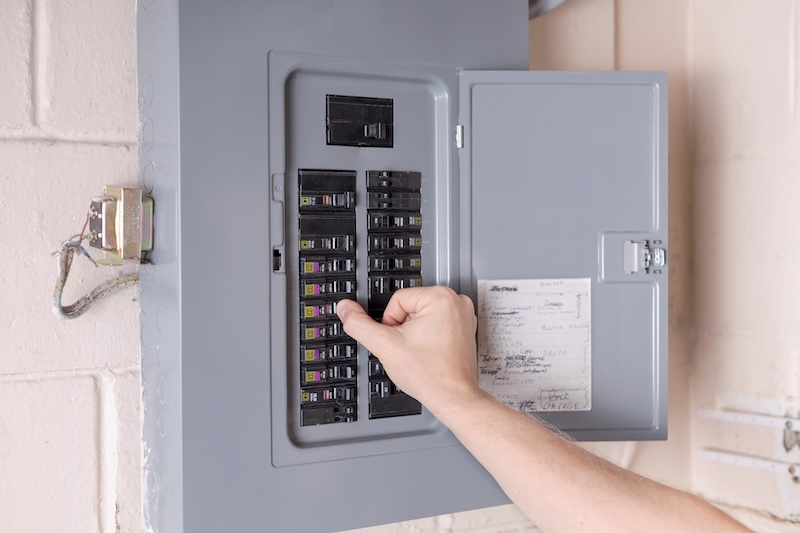How to Identify and Resolve Circuit Breaker Problems Before They Become Dangerous
Circuit breakers are the unsung heroes of your home’s electrical system, working around the clock to protect your family and property from electrical hazards. These critical safety devices automatically shut off power when they detect dangerous conditions like overloads, short circuits, or ground faults. However, when circuit breakers start malfunctioning or showing signs of wear, they can create serious safety risks that every North Texas homeowner needs to understand and address promptly.
At NTX Electric, we’ve responded to countless electrical emergencies throughout the Dallas-Fort Worth metroplex where homeowners ignored early warning signs of circuit breaker problems. Our licensed electricians have the expertise and local knowledge to quickly diagnose circuit breaker issues, from simple overloads to complex electrical panel problems that require immediate professional intervention. When electrical issues arise, North Texas families trust NTX Electric because we combine technical expertise with genuine care for our community’s safety and peace of mind.

Common Circuit Breaker Problems Every Homeowner Should Recognize
Frequent Tripping: More Than Just an Inconvenience When circuit breakers trip repeatedly, they’re sending a clear message that something is wrong with your electrical system. While occasional tripping can be normal when circuits are temporarily overloaded, frequent tripping often indicates serious underlying issues that require professional attention. Common causes include overloaded circuits, short circuits, ground faults, or the circuit breaker itself beginning to fail.
Circuit overloading occurs when too many electrical devices draw power from a single circuit, exceeding the breaker’s safe capacity. Modern homes in North Texas often struggle with this issue as families add more electronics, appliances, and devices without upgrading their electrical systems. A standard 15-amp or 20-amp circuit can only handle so much electrical load before the safety mechanism kicks in.
Short circuits represent a more serious problem where electrical current finds an unintended path, often due to damaged wiring, loose connections, or faulty appliances. Ground faults occur when electrical current escapes its intended path and flows toward the ground through an unintended route, potentially through water or a person’s body.
Visual and Sensory Warning Signs Your circuit breakers and electrical panel provide important visual clues about potential problems. Scorch marks, discoloration, or visible damage around circuit breakers indicate overheating or electrical arcing that poses immediate fire risks. A burning smell emanating from your electrical panel should trigger immediate action—turn off the main power and contact a licensed electrician immediately.
Physical signs of trouble include circuit breakers that feel hot to the touch, corrosion or rust on panel components, and flickering lights throughout your home when large appliances start up. These symptoms may signal that your electrical panel is struggling to meet your home’s power demands.
Safe Troubleshooting Steps You Can Perform
Basic Reset Procedures When a circuit breaker trips, proper reset procedure is crucial for both safety and effectiveness. First, identify which breaker has tripped—it will typically be in a neutral position between “on” and “off” or may show a red or orange indicator. Before resetting, turn off or unplug devices connected to that circuit to reduce the electrical load.
To properly reset a circuit breaker, push the switch firmly to the “off” position first, then push it to the “on” position. You should hear a definitive click when the breaker engages properly. If the breaker immediately trips again or won’t stay in the “on” position, stop attempting to reset it and call a professional electrician.
Load Testing and Circuit Evaluation If a circuit breaker stays reset initially, you can perform basic load testing to identify potential problems. Start by leaving all devices disconnected from the circuit, then gradually reconnect them one at a time. If the breaker trips when you connect a specific device, that appliance may have an electrical fault or the circuit may be overloaded.
When to Call Professional Electricians Immediately
Dangerous Conditions Requiring Immediate Attention Certain circuit breaker problems require immediate professional intervention to prevent serious safety hazards. Never attempt to repair or replace circuit breakers yourself—this work requires specialized knowledge, tools, and licensing to perform safely. If you smell burning odors, see visible sparks, notice scorch marks, or feel excessive heat from your electrical panel, shut off the main power if you can do so safely and contact emergency electrical services immediately.
Repeated failure of circuit breakers to reset, even with all loads removed from the circuit, indicates the breaker itself has failed and poses potential safety risks. Old circuit breakers that are several decades old may not provide reliable protection even if they appear to function normally.
Complex Electrical System Issues Some circuit breaker problems indicate broader electrical system issues that require comprehensive professional evaluation. If multiple circuits in your home experience problems simultaneously, your electrical panel may be undersized for your family’s electrical needs or suffering from systemic problems.
Ground Fault Circuit Interrupter (GFCI) and Arc Fault Circuit Interrupter (AFCI) breakers require specialized knowledge to diagnose and repair properly. These advanced safety devices protect against specific types of electrical hazards, and problems with these breakers often indicate dangerous conditions requiring immediate professional attention.
Professional Solutions and System Upgrades
Professional electricians provide comprehensive electrical system evaluations that identify both immediate problems and potential future issues. This assessment includes testing circuit breaker functionality, measuring electrical loads, evaluating wiring conditions, and ensuring your electrical system meets current safety codes and standards.
Many North Texas homes, particularly those built before 2000, have electrical systems that struggle to meet modern electrical demands. Professional evaluation can determine whether your electrical panel needs upgrading, circuits require additional capacity, or safety devices need updating to protect your family properly.
Today’s circuit breakers include advanced safety features like GFCI and AFCI protection that weren’t available in older electrical systems. Professional electricians can retrofit these safety enhancements into existing electrical systems where appropriate, providing better protection for modern electrical loads.
Regional Considerations for North Texas Homes
North Texas weather patterns create specific challenges for electrical systems that can affect circuit breaker performance. Summer heat waves increase electrical demand as air conditioning systems work overtime, potentially overloading circuits that seemed adequate during milder weather. Severe thunderstorms with lightning can cause power surges that damage circuit breakers and other electrical components.
Many homes in the Dallas-Fort Worth area were built during periods of rapid growth with electrical systems sized for the technology available at that time. As families add more electronics, electric vehicles, smart home devices, and modern appliances, these older electrical systems often struggle to keep pace with increased demands.
Don’t Risk Your Family’s Safety with Circuit Breaker Problems! Contact NTX Electric Today!
Circuit breaker issues are never just inconveniences—they’re warning signals that your electrical system needs professional attention to prevent dangerous conditions. Ignoring these warning signs can lead to electrical fires, equipment damage, and serious safety hazards that put your family at risk.
Contact NTX Electric immediately if you’re experiencing circuit breaker problems, electrical odors, or any other electrical system concerns. Our experienced technicians provide emergency electrical services and comprehensive electrical system evaluations that identify problems before they become dangerous. Don’t wait for electrical problems to escalate—call NTX Electric now for professional electrical services you can trust to keep your family safe.
